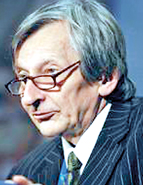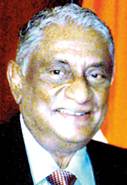Sunday Times 2
Remembering wars: The spirit of service and sacrifice
Remembrance Sunday is a day on which we remember, not wars in general, but the individual sacrifices made in wars. We remember, in a silence that says more than words ever can, the 11th hour of the 11th day of the 11th month in 1918, when at last the guns fell silent on the most tragic and costly foreign war in our history. We remember the contribution of UK and Commonwealth servicemen and women in two world wars and later conflicts.

Prof. Adam Roberts
My job at Balliol for many years, when I was Montague Burton Professor of International Relations, involved teaching and researching about war and the changing character of war. I’ll mention those matters in a moment, but first we should recognise the extraordinary sacrifices made by students and staff of this College in two world wars.
On your way into the chapel you will have passed, and noted, the large number of names – nearly 200 – of those from Balliol who died in the First World War, and the names, too (mercifully somewhat fewer) who died in the Second World War. The second list, unlike the first, contains the names of Germans who had studied at Balliol and then died in the war. Their inclusion in the list was a magnanimous gesture, perhaps – but made easier by the fact that one of them was Adam von Trott, who had died as a result of taking part in the attempt to kill Hitler on 20 July 1944.
Such lists can be found in other Oxford and Cambridge colleges – for it was above all young officers, leading the troops, who made the ultimate sacrifice. Some of these officers enjoyed war, at least at the start, and some hated it.
There’s a book, in two volumes, in the college library – Balliol College War Memorial Book – that gives a portrait of each of the men (also mentioning three college servants) killed in the First World War. It is humbling and haunting to see their portraits and to read about each individual. The book contains a poem by Arthur Lewis Jenkins, who died aged 25 – actually while training in Yorkshire with the Royal Flying Corps. Five years earlier, in 1912, he had written a poem, ‘And Some There Be That Have Left
No Memorial’ which concluded:
What, then, of those whose names have passed away,
Who won no guerdon that might seal their worth,
Strong men that bore the burden of the day,
The salt of all the earth?
Sound be their sleep! For them all hope and pride
Are over, all the fever and the fret:
But these, forgotten of the hurrying years,
The gods shall not forget.
Chapel is an appropriate place to recall those who have died in war. And I can’t help thinking of my own relatives – my mother’s two eldest brothers who died in the First World War, one at Loos and the other in East Africa. Yet chapel is also an appropriate place to think about the role of churches in war, and about the very different circumstances that we confront today.
All of us in this chapel have had the privilege of living most or all of our lives in a time in which international wars have been few and far between. Since 1945 such wars have been less frequent and less costly than in earlier periods – but they have happened, and we cannot be certain that their decline will continue. We honour the dead of the Korean War, and the Falklands War (whose thirtieth anniversary falls this year). We also honour those who died in relatively recent or ongoing conflicts in Northern Ireland, Iraq, Afghanistan and elsewhere.
Most of the conflicts in which the UK has been involved in the past two decades have had a strong element of civil war – as in the wars in former Yugoslavia, which I witnessed directly. And these wars, tragically, have often pitted one religious community against another.

Lakshman Kadirgamar
Thus today it is common for religions – Christianity, Islam, and Buddhism and others – to be seen as part of the problem: as providing one basis for conflict within societies. This is a serious and widely held worry, and it helps to explain why so many people have drifted away from organised religion.
It is true, too, that no religion gives us a completely consistent and coherent set of doctrines about war. Consider the two remarkably powerful but very different readings we have heard today at this service:
First, the wonderful words from the book of Micah 4: 3, which seem to promise that in the ‘last days’ there will be peace on earth: … they shall beat the swords into ploughshares, and their spears into pruning hooks; nation shall not lift up a sword against nation, neither shall they learn war anymore.’
Then, the very different but no less moving words from Romans 8: 38-39, which seem to suggest that Christian faith is on a completely different plane from secular improvement:
‘For I am persuaded that neither death, nor life, nor angels, nor principalities, nor powers, nor things present, nor things to come,
‘Nor height, nor depth, nor any other creature, shall be able to separate us from the love of God, which is in Christ Jesus our Lord.’
Despite such visions being very different and arguably inconsistent, we have much to learn from our intellectual and religious inheritance about the problem of war. I could cite teachings from Islamic, Hindu or Buddhist thinkers. A good example, perhaps more appropriate to these surroundings, is the Christian tradition of thought about ‘just war’. The term is misleading: ‘justifiable uses of force’ might be a more accurate and less inflammatory description. But whatever term is used, whatever religious or secular tradition is drawn on, criteria for assessing whether a particular use of force is legitimate remain hugely important.
We also need to be constantly reminded of the requirement to observe limitations in war, for example with regard to the treatment of prisoners and detainees. There are religious as well as secular origins of that tradition too. And it has often been religious figures who have had the courage to speak out against questionable methods of war – as with Bishop Bell of Chichester’s condemnation of area bombing in the Second World War.
We British are not always very good at handling the difficult issues raised in war. It is proper that there should now (2012) be a monument in London in memory of Bomber Command, but it is unfortunate that there is no allusion to the controversies surrounding UK bombing policy in 1939-45, other than one inscription high up by the interior of the roof, which, if you can spot it, commemorates all the victims of bombing in the Second World War.
To honour the sacrifices of past wars is not to bless the wars as a whole. It does not imply an uncritical attitude to the narrow nationalisms, colonial rivalries, Social Darwinist ideas, or strategic blunders, that contributed to the outbreak and subsequent tragic consequences of the First World War. Rather, it is recognition that, in a rough and tough world, we need a sense of social solidarity and willingness to sacrifice our interests and even our lives if our societies are to survive and prosper. We need to show that the values of the casino, so evident in our recent banking scandals, are not the values of our society as a whole. We need to honour the long Balliol tradition of public service.
Perhaps I can be forgiven for concluding on a personal note regarding a modern casualty in war whom I knew, first as a correspondent and then as a friend, for over 40 years. In 1957 a young Sri Lankan lawyer, Lakshman Kadirgamar, came to this college to do a postgraduate degree in law. He became President of the Oxford Union, and went on to have a successful career in law, working mainly with international organisations in Geneva.
A Tamil of Christian family background, he came to believe that different religions offered different routes to the same mountain-top, and should never be viewed as, or act as, deadly rivals. In 1994, at the age of 62, seeing his country in deep trouble due to corruption, poor leadership, and internal conflict, he went into politics and became foreign minister. He was remarkably effective in representing Sri Lanka abroad, in facing up to its problems at home, and in recognising the key issues at stake in the struggle between the government and the Liberation Tigers of Tamil Eelam. He was a strong critic of political violence, and a believer in observing human rights law and the law of armed conflict. He was informed that, precisely because he was a prominent Tamil who believed in the unity of Sri Lanka, he was on a Tamil Tiger hit list. In August 2005 he was killed – perhaps the first Honorary Fellow of this college to have been assassinated. He knew this fate awaited him, and was determined to die with his head held high. I’ve collected his main writings and speeches in a book, which will soon be in the college library, and all proceeds from which will be to support students from Asia, and in particular South Asia, to study at Oxford.
So when we honour Balliol’s war dead, as we rightly do today, we should recognise that, in the very different wars of today’s world, the spirit of service and sacrifice is still needed, and still endures.
(Please see the Plus section for excerpts of speeches made by Sir Adam Roberts and Sir Henry Brooke at the launch of the book ‘Democracy, Sovereignty and Terror: Lakshman Kadirgamar on the Foundations of International Order.)
Follow @timesonlinelk
comments powered by Disqus



















